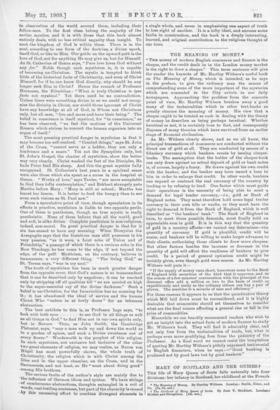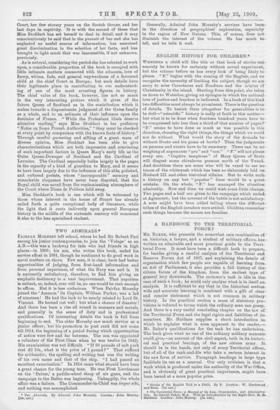MARY OF SCOTLAND AND THE GUISESt THE life of Mary
Queen of Scots falls naturally into four divisions: her infancy in Scotland, her childhood at the French • The Meaning of Money. By Hartley Withers. London 1 Smith, Elder, and Co, Rs. ad. net.1 t The Girlhood of Mary Queen of Soots. By Jane T. Stoddart. London; Hodder and Stoughton. [12s. net.] Court, her few stormy years on the Scotch throne, and her last days in captivity. It is with the second of these that Miss Stoddart has set herself to deal in detail, and it may conscientiously be said that in the pursuit of her end she has neglected no useful source of information, has exercised great discrimination in the selection of her facts, and has brought to light much that was inaccessible, if not unknown, previously.
As is natural, considering the period she has selected to work upon, a considerable proportion of the book is occupied with little intimate matters connected with the ailments, love of finery, whims, fads, and general waywardness of a favoured child at the chief Court in Europe ; but such details have their legitimate place in contributing to our understand- ing of one of the most arresting figures in history. The chief value of the book, however, lies not so much in the very interesting picture which it gives of the future Queen of Scotland as in the contribution which it makes towards a dispassionate judgment of the Guise family as .4 whole, and to an estimate of their influence upon the destinies of France. "While the Protestant libels deserve attentive reading," says Miss Stoddart in her prefatory "Notes on Some French Authorities," "they must be checked at every point by comparison with the known facts of history." Through careful garnering and sifting of a great mass of diverse opinion, Miss Stoddayt has been able to give characterisations which are both impressive and convincing of such important factors in Queen Mary's early life as the Guise Queen-Dowager of Scotland and the Cardinal of Lorraine. The Cardinal especially bulks largely in the pages in the capacity of a kind of guardian to Mary, and it seems to have been largely due to the influence of this able, polished, and cultured prelate, whose "incomparable" memory and remarkable eloquence have never been disputed, that the Royal child was saved from the contaminating atmosphere of the Court where Diane de Poitiers held sway.
Miss Stoddart's book is one which will be welcomed by those whose interest in the house of Stuart has already called forth a quite exceptional body of literature, while the light that it casts indirectly upon general European history in the middle of tho sixteenth century will commend it also to the less specialised student.











































 Previous page
Previous page